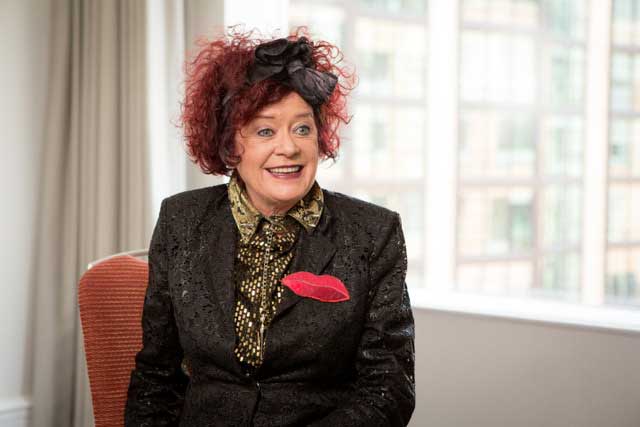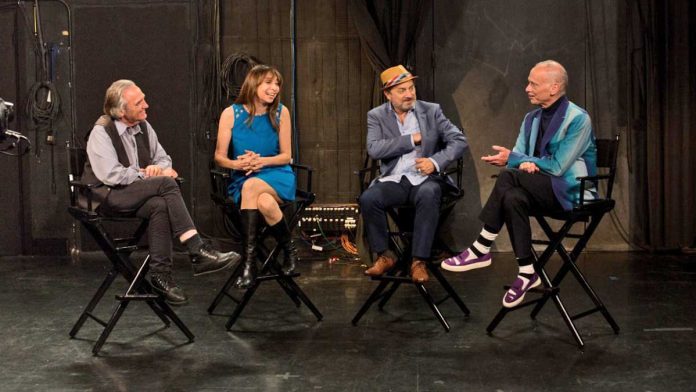The ambitious new three-part documentary series, “Time Warp: The Greatest Cult Films of All-Time,” showcases many queer and Philadelphia connections as filmmakers, actors, and critics gush about various cult movies. Part 1, titled “Midnight Madness,” was released on Amazon, iTunes, and other platforms this week. Parts 2 (“Sci-fi and Horror”) and 3 (“Comedy and Camp”) will be issued May 21 and June 21, respectively.
The series features a panel, hosted by director Joe Dante, and includes actors Illeana Douglas and Kevin Pollak as well as queer filmmaker John Waters. This team introduces some but not all of the films showcased in “Time Warp.” In these segments, Waters shows his unbridled enthusiasm for Samuel Fuller’s “The Naked Kiss,” and Russ Meyer’s “Faster, Pussycat! Kill! Kill!” by recounting key scenes and dialogue. His remarks are infectious and will likely prompt viewers to want to see those films after watching this one. Curiously, Kevin Pollak does not talk at all during any of these segments.
The documentary opens with a vigorous discussion of arguably the most popular midnight movie of all time, “The Rocky Horror Picture Show.” The film was a failure in its initial theatrical release but became phenomenally successful when it first appeared on the midnight movie circuit in 1976. It provided a safe space for LGBTQ folks, creating a sense of belonging while it delivered a “Don’t dream it, be it!” message. The film also invited audience participation, although the documentary does not get into the experience of a live cast performing in front of the film — as was the case in many theaters. “Rocky Horror” played nearly 200 midnight shows across the country in its heyday.
Out gay Philadelphian Ray Murray, who co-owned the Theater of the Living Arts, a former film revival house/repertory cinema (now a music venue), speaks fondly in “Time Warp” about “Rocky Horror.” He claims the film’s popularity paid the theater’s rent, as 415 people would sell out the midnight showing of “Rocky Horror” every weekend. The film ran for 20 years. He also amusingly recalls the non-paying “guests” that would enjoy the rice and toast that littered the theater’s floor after a screening.

Other memories include those by actress Patricia Quinn, who played Magenta in “Rocky Horror,” talking about the fans and the film’s signature anthem, “The Time Warp,” and out, gay writer and comedian Bruce Vilanch recounting an interesting experience of accompanying actor Tim Curry, who played Frank N. Furter in the film, to a screening in New York City.
As the documentary continues, it provides observations and anecdotes about a number of cult films, from “The Big Lebowski,” and Pam Grier’s pro-feminist blaxploitation pictures, “Coffy” and “Foxy Brown,” to “Reefer Madness” which was campy in its failed seriousness. In fact, people are ironically encouraged by “Time Warp” to watch this somber educational film on the dangers of marijuana — while stoned.
Other films highlighted include Tod Browning’s chilling 1932 feature, “Freaks,” about a group of circus performers who get revenge on a beautiful trapeze artist (Olga Baclanova) who tries to scam one of them out of his inheritance. The film, which is notable for the characters chanting “One of us!” — signifying acceptance as part of a group of “freaks” — is cited by Vilanch as being, “One of the scariest movies of all time.”
“Time Warp” then segues to “Eraserhead,” another disturbing film that was essential midnight movie viewing. Local film critic Carrie Rickey explains in the documentary that Lynch was a student at Pennsylvania Academy of Fine Arts, and that the section around East Fairmount Avenue, where he lived, has since been dubbed “Eraserhood.”
One of the best segments in “Time Warp” is the analysis of John Waters’ “Pink Flamingos,” which includes clips and reflections about several key scenes, including the film’s notorious climax. Waters discusses his experiences paying obscenity fines in courtrooms — because they were cheaper than paying the lawyers — and because the film was obscene if viewed in a courtroom with a jury at 10 a.m. and not in a crowded theater at midnight. But the fact that “Pink Flamingos,” about two rival families competing for the title of “Filthiest Person Alive,” is appreciated by legions of fans is cause for celebration, and “Time Warp” captures that.
The documentary also focuses on the devoted audiences for “Harold and Maude” and “This Is Spinal Tap” before it provides case studies of what it calls “subversive films” such as the aforementioned, “Faster, Pussycat! Kill! Kill!” and Penelope Spheeris’s groundbreaking 1981 documentary, “The Decline of Western Civilization,” about the punk music scene in Los Angeles.
Other films such as John Carpenter’s “Assault on Precinct 13,” Walter Hill’s “The Warriors” and Kathryn Bigelow’s “Point Break” are presented, but their inclusion, while not invalid, feels arbitrary; these are far more popular films. Where is Alejandro Jodorowsky’s “El Topo,” or any of the music-themed films — “The Harder they Come,” “Pink Floyd’s The Wall,” and “Stop Making Sense” — that were staples on the midnight circuit for years?
Perhaps they will be featured in future installments. At least queer viewers can look forward to discussions of “Showgirls,” “Glen or Glenda?,” and “Hedwig and the Angry Inch,” in part 3 of “Time Warp.”
